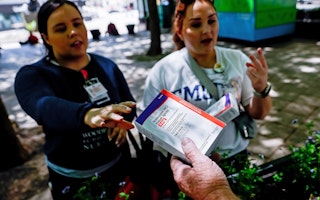In Georgia, Living Proof That Harsh Punishments Don’t Stop Drug Use
By David Otiashvili
In the Republic of Georgia, there is one crime that is punishable with more prison time than rape or even murder: possession of more than one gram of heroin, regardless of intent.
Georgia positions itself as a model for government reform and new thinking. We have one of the youngest prime ministers in the world and government buildings of glass to symbolize transparency and visible change. But on drugs, old-school punitive policies remain the norm. Starting in 2007, the government enacted a policy of wide-scale street sweeps, drug testing, crippling fines, and harsh sentences.
Each year, police in Georgia detain tens of thousands of people in the streets and subject them to urine drug tests. If this single test is positive (contrary to standard practice, no confirmatory test is used) a fine equaling twice the monthly salary of the average Georgian is imposed. Subsequent positive tests during a 12-month period can result in prison time.
A new study by me and colleagues from the addiction research center Alternative Georgia takes a hard look at the impacts of this approach. We found that these punitive measures didn’t stop people from using drugs—in fact, 89 percent of people punished for drug use after positive urine tests returned to drugs immediately.
But the street sweeps did result in behavior change, though presumably not the kind authorities intended: drug users adopted risky practices to avoid being identified by the police.
For instance, many people switched from heroin to buprenorphine or amphetamines to evade standard the drug tests. These drugs are commonly used in a way that requires a group of injectors to collaborate, either because the drug is expensive or because a group of people is required to procure and cook the substance. In either instance, injection often happens with several people sharing a common container, filters, or large-volume syringes used for loading smaller syringes, increasing the risk of blood-borne infections.
Chemicals are used for processing many of the homemade stimulants and opioids that people switched to in order to avoid police detection. Some of these—such as phosphorus, iodine, potassium permanganate, and gasoline—cause serious soft tissue damage, necrosis, gangrene, and neurological side effects.
Police crackdowns have also driven people who use drugs into their homes, where they more often inject alone to avoid detection, increasing their risk of dying from an overdose. And attempts to self-medicate and substitute traditional drugs with new ones have resulted in most drug injectors switching to unstructured poly-substance use, meaning they consume whatever drugs are available at the time, often in combination, in an effort to mimic the effect of their drug of choice.
This mixing also increases overdose risk. For instance, harm reduction services in Georgia have reported higher demand for naloxone (the antidote used to prevent overdoses) among people who use krokodil, a homemade opioid. Elevated overdose risk was typically associated with the fluctuating quality and potency of the homemade drug.
Georgia’s ombudsman, who is charged with monitoring and protecting human rights, has filed a constitutional court case challenging the legality of drug testing practices in the republic. But greater international attention is needed.
As the world prepares to reconsider its approach to drugs at a United Nations General Assembly Special Session in April, Georgia should be seen as proof that even the harshest punishments don’t stop drug use, and can in fact do more harm than good. People who use drugs need to be able to access harm reduction services and drug treatment programs. Instilling fear and perpetuating stigma is not the way to get them there.
Alternative Georgia is a former grantee of the Open Society Foundations.
David Otiashvili, MD, is director at Alternative Georgia.


